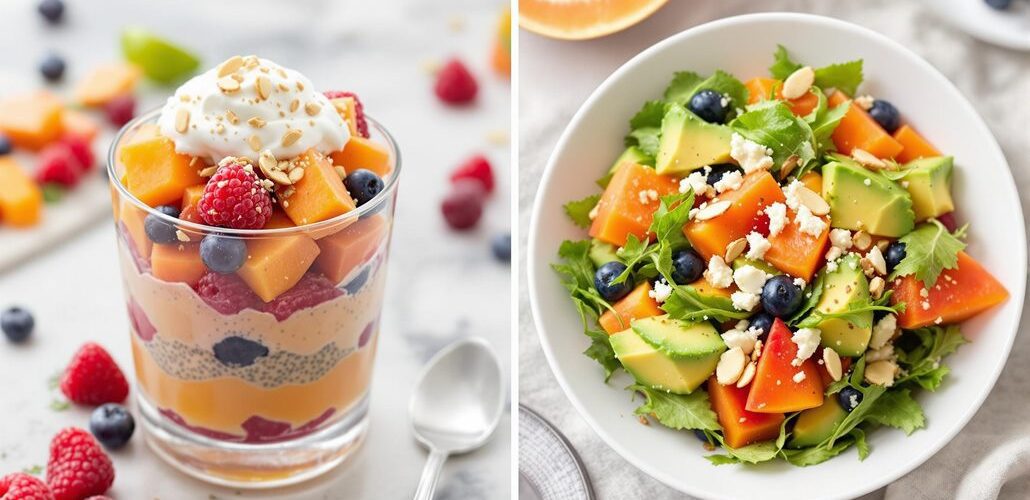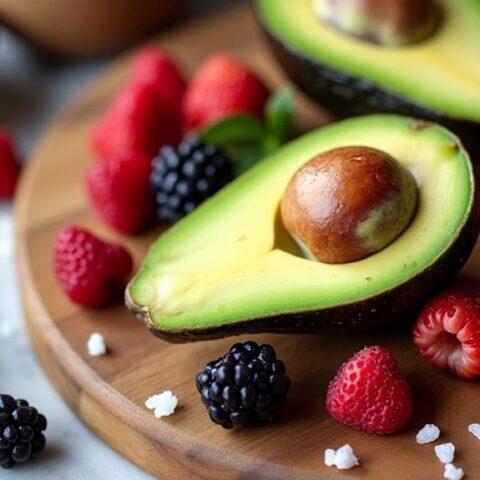
Papaya is not keto-friendly primarily due to its high net carbohydrate content, about 9.12 grams per 100 grams, potentially disrupting ketosis. A medium-sized papaya can have up to 45 grams of net carbs, surpassing the typical daily keto limits of 20-50 grams. Its low fat content, at only 0.26 grams per 100 grams, conflicts with the keto diet's high-fat requirement for energy. Moderate consumption can raise blood sugar levels, challenging ketotic balance. For those following a ketogenic diet, opting for lower-carb fruits like strawberries or avocados could better support ketosis without exceeding carbohydrate limits. Further nuances await comprehension.
Key Takeaways
- Papaya has 9.12 grams of net carbs per 100 grams, making it high in carbohydrates for keto.
- A medium papaya exceeds daily keto carb limits, risking disruption of ketosis and weight loss goals.
- Its high natural sugar content can quickly accumulate, making portion control challenging on a keto diet.
- Papaya's low fat content doesn't align with the keto emphasis on high fat intake for energy.
- Lower-carb fruit alternatives like strawberries and avocados are better suited for maintaining ketosis.
Papaya's Carb Content
Although papaya is celebrated for its nutritional benefits, its carbohydrate content poses significant challenges for individuals adhering to a ketogenic diet. Papaya's net carb content is approximately 9.12 grams per 100 grams, categorizing it as high in carbs relative to the stringent requirements of a strict keto diet.
This high carbohydrate content primarily comprises natural sugars, which can rapidly contribute to the daily carbohydrate intake and potentially disrupt the delicate balance required to maintain ketosis. For individuals on a strict keto diet, where carb intake is typically limited to 20-50 grams per day, consuming papaya can pose a significant risk.
As ketosis is essential for fat burning and weight loss, consuming high-carb foods like papaya can undermine these goals. A medium-sized papaya contains around 45 grams of net carbs, surpassing the upper limit of daily carb intake for many keto followers.
Consequently, even small portions can quickly tip the daily carb counts over the allowable limit, complicating efforts to sustain a ketogenic state. The necessity for meticulous tracking of daily carb intake becomes paramount for those committed to a keto lifestyle.
Given papaya's high net carb content, individuals must carefully consider the inclusion of such fruits in their diet to avoid hindering their ketogenic goals.
Impact on Ketosis
The carbohydrate content of papaya, approximately 9.12 grams of net carbs per 100 grams, poses a significant challenge for individuals adhering to a ketogenic diet, where daily carbohydrate intake is typically limited to 20-50 grams.
Consuming papaya, even in small portions, can risk disrupting ketosis by contributing substantially to the daily carb total. In managing type 2 diabetes, maintaining stable blood sugar levels is essential, and a ketogenic diet greatly aids in achieving this through reduced carbohydrate intake.
As a result, for those committed to maintaining ketosis, papaya requires either strict portion control or complete avoidance to prevent exceeding the ketogenic threshold.
High Carb Content
In the context of a ketogenic diet, understanding the carbohydrate content of foods is essential to maintaining ketosis, a metabolic state where the body uses fat as its primary energy source.
Papaya, a tropical fruit, presents a challenge due to its high carb content. Specifically, it contains approximately 9.12 grams of net carbs per 100 grams. This substantial carbohydrate presence can markedly impact daily carb limits, which typically range from 20 to 50 grams for those adhering to a ketogenic diet. A medium-sized papaya, with around 45 grams of net carbs, can easily exceed the daily allowance, posing a risk to ketosis maintenance.
For individuals on a ketogenic diet, managing carb intake is critical, as even a small portion of papaya can quickly surpass the carb threshold necessary for sustaining ketosis.
The high carbohydrate content in papaya requires careful consideration and often exclusion from the diet to prevent exceeding daily carbohydrate limits. Despite its nutritional benefits, such as vitamins and fiber, the net carb load of papaya makes it unsuitable for strict ketogenic dietary practices.
As a result, those committed to a ketogenic lifestyle are advised to avoid high-carb fruits like papaya to maintain the desired metabolic state.
Ketosis Disruption Risk
Steering the risk of ketosis disruption necessitates a thorough understanding of the carbohydrate content in foods like papaya, which, despite its nutritional benefits, presents a considerable challenge for ketogenic dieters.
Papaya's carbohydrate profile, with approximately 9.12 grams of net carbs per 100 grams, poses a substantial risk for those adhering to a strict ketogenic lifestyle. Such a carb count can lead to ketosis disruption, as even modest consumption can push daily net carb intake beyond the typical threshold of 20-50 grams necessary to maintain ketosis.
A medium-sized papaya encompasses around 45 grams of net carbs, which can markedly exceed the daily carb limit for many keto practitioners. This high carbohydrate content can raise blood sugar levels, counteracting the ketogenic diet's low-carb objective and impairing efforts to achieve or sustain a healthy weight.
Managing net carb intake is essential to prevent ketosis disruption, requiring vigilant monitoring and strategic dietary planning.
Limited Portion Flexibility
Steering through the constraints of a ketogenic diet requires a keen awareness of portion control, particularly with high-carb fruits like papaya. With approximately 9.12 grams of net carbs per 100 grams, papaya presents a challenge for those adhering to the strict carbohydrate limits typical of the ketogenic diet, which generally range from 20 to 50 grams per day.
A medium-sized papaya, containing around 45 grams of net carbs, can easily surpass the daily carb allowance, especially for strict keto practitioners. This necessitates a meticulous approach to serving size and carb consumption to prevent undermining ketosis.
The high net carb content limits the flexibility of incorporating papaya into a ketogenic meal plan. Even modest servings can accumulate, potentially disrupting ketosis if not carefully controlled. Consequently, portion control becomes paramount to avoid inadvertent excesses in carb consumption.
Some may consider consuming papaya earlier in the day to better distribute carb intake; however, this strategy still requires vigilant monitoring. The inherent carbohydrate density of papaya demands rigorous tracking to align with ketogenic dietary principles, underscoring the need for precision in dietary planning when attempting to integrate this fruit into a low-carb regimen.
Low Fat Contribution
Remarkably, papaya's contribution to a keto-friendly diet is limited due to its low fat content, standing at merely 0.26g of fat per 100g serving. This low fat characteristic is in stark contrast to the keto diet's macronutrient ratio, which emphasizes a substantial fat intake, typically around 70%, to drive the metabolic state of ketosis.
In ketosis, the body relies on fat for energy, utilizing stored fats instead of carbohydrates. The effective fat-burning mechanism of the ketogenic diet supports weight loss while maintaining energy levels, but papaya's nutritional profile, dominated by carbohydrates and negligible fats, inherently conflicts with this requirement.
The ketogenic diet demands a high intake of healthy fats to maintain energy levels and guarantee satiety. Foods rich in fats, such as avocados and olive oil, are essential components of this dietary regimen.
In comparison, papaya fails to contribute meaningfully to the fat macronutrient quota necessary for effective ketosis. Including papaya in a keto meal plan could disrupt the delicate balance required to sustain this metabolic state, undermining the diet's purpose.
Ultimately, the minimal fat contribution from papaya highlights its incompatibility with the high-fat dietary needs that are vital for the success of a ketogenic lifestyle.
Alternative Keto Fruits
In exploring alternative keto fruits, it is essential to take into account options that maintain low carbohydrate content while offering nutritional benefits.
For example, in addition to fruits, incorporating non-starchy vegetables like spinach and kale can greatly enhance nutrient intake without disrupting ketosis goals.
Fruits like olives, avocados, and tomatoes stand out with their minimal net carb values, providing a viable solution for those adhering to a ketogenic diet.
Additionally, raspberries serve as a nutrient-dense choice, offering a balance of flavor and health benefits that align with keto-friendly principles.
Low-Carb Fruit Choices
For individuals adhering to a ketogenic diet, selecting the right fruits is essential in maintaining ketosis while still enjoying a diverse range of flavors. The keto diet emphasizes low-carb, high-fat consumption to facilitate weight loss and enhance metabolic health. Hence, understanding the net carb content of fruits is critical for keto dieters seeking healthy, flavorful options without compromising their dietary goals.
'''markdown
| Fruit | Net Carbs (per 100g) | Key Benefit |
|---|---|---|
| Strawberries | 5.5g | Low carb, sweet |
| Avocados | 1.8g | Healthy fats |
| Coconut Meat | 6.23g | High in fiber |
'''
Strawberries present a palatable choice with merely 5.5g of net carbs per 100g, allowing for a sweet treat that is keto-compatible. Avocados, with just 1.8g of net carbs per 100g, offer a dual advantage by providing healthy fats that are essential for maintaining ketosis. Coconut meat, containing 6.23g of net carbs per 100g, is another low-carb option that enriches the diet with fiber and beneficial fats. Incorporating these fruits can enhance both the nutritional profile and palatability of a keto diet, facilitating adherence and promoting overall health while supporting weight loss objectives.
Nutrient-Dense Alternatives
Selecting nutrient-dense fruits that align with the ketogenic diet requires a careful evaluation of net carb content and nutritional benefits. Papaya, with its higher carbohydrate content, poses challenges for those adhering to the typical keto diet.
In contrast, nutrient-dense alternatives like strawberries and avocados offer significant health benefits while maintaining low net carbs per serving. Strawberries provide only 5.5 grams of net carbs per 100 grams, making them a viable substitute for papaya. Their rich antioxidant profile further enhances their appeal as a keto-friendly option.
Avocados, with a mere 1.8 grams of net carbs per 100 grams, are another exemplary choice. They are packed with healthy fats essential for ketosis, aligning seamlessly with the ketogenic dietary framework.
Coconut meat, offering 6.23 grams of net carbs per 100 grams, is another nutrient-dense alternative that supplies both fiber and beneficial fats, supporting digestive health while adhering to keto principles.
Moreover, cantaloupe, with 7.6 grams of net carbs per 100 grams, can satisfy sweet cravings without disrupting the ketosis process.
Keto-Friendly Fruit Options
Exploring keto-friendly fruit options requires a nuanced understanding of carbohydrate content and nutritional value, pivotal for those adhering to a ketogenic diet. Fruits like strawberries, avocados, and olives offer low net carb counts, making them suitable alternatives to higher-carb fruits like papaya. With only 5.5g of net carbs per 100g, strawberries provide a sweet yet keto-compatible option. Similarly, avocados are notable for their low net carb content of 1.8g per 100g, alongside healthy fats that support the high-fat, low-carb paradigm of the keto diet.
'''markdown
| Fruit | Net Carbs (per 100g) |
|---|---|
| Strawberries | 5.5g |
| Avocados | 1.8g |
| Olives | 0.5g |
'''
Olives are exceptionally keto-friendly, with a mere 0.5g of net carbs per 100g, offering both healthy fats and antioxidants. For those seeking variety, cantaloupe, with a moderate 7.6g of net carbs per 100g, can be incorporated sparingly into a keto meal plan without exceeding daily carb limits. Black olives, with 2.9g of net carbs per 100g, offer versatility as a savory addition to salads and dishes. These fruits allow individuals to maintain a balanced ketogenic diet without compromising flavor or nutritional intake.
Managing Cravings
Managing cravings on a keto diet, especially for high-carb fruits like papaya, can be quite challenging due to the strict carbohydrate limits inherent in such dietary regimens. Papaya's net carb content is significantly high, with a mere 100g serving delivering approximately 9.12g of net carbs, potentially consuming a substantial portion of the typical 20-50g net carb limit allotted per day on a ketogenic diet.
To mitigate these cravings, individuals can opt for lower-carb fruits such as strawberries, which provide 5.5g net carbs per 100g, or avocados, offering an even lower count of 1.8g net carbs per 100g. These alternatives can help satisfy fruit cravings while remaining within daily carb thresholds.
Additionally, incorporating keto-approved snacks like Parmesan cheese crisps can provide a savory option to balance sweet cravings. Incorporating keto-approved sweeteners like stevia is another effective strategy to manage sweet cravings without exacerbating net carb intake.
The utilization of nutrition tracking apps can further aid in monitoring daily carbohydrate consumption, ensuring adherence to keto guidelines and preventing inadvertent excess due to cravings. Balancing the enjoyment of flavors with dietary restrictions is essential for long-term success on a keto diet.
Expert Recommendations
For individuals adhering to a ketogenic diet, expert recommendations emphasize the importance of carefully regulating carbohydrate intake to maintain ketosis. The net carbs present in various foods play a critical role in this dietary approach. Papaya, in particular, presents a challenge due to its carb profile; it contains approximately 9.12 grams of net carbs per 100 grams. Nutrition experts highlight that even moderate consumption can quickly impact daily carb limits, given that the ketogenic diet typically restricts net carbs to 20-50 grams per day.
| Fruit | Net Carbs (per 100g) |
|---|---|
| Papaya | 9.12g |
| Strawberries | 5.5g |
| Avocados | 1.8g |
| Raspberries | 5.4g |
| Blackberries | 4.3g |
In addition to the inherent carb profile of papaya, its high sugar content poses a significant risk to maintaining ketosis. A medium-sized papaya can contain up to 45 grams of net carbs, which exceeds the daily carb allowance for many individuals on a strict ketogenic diet. Dietitians suggest closely monitoring portion sizes to avoid unintentional excess carb intake. They often recommend alternative fruits like strawberries or avocados, which provide essential nutrients and flavors with fewer net carbs, aligning better with ketogenic dietary goals. Professional guidance can aid in making informed dietary choices.
Frequently Asked Questions
Can You Eat Papaya in a Keto Diet?
Papaya's nutritional benefits are offset by its high net carb content, impacting ketosis adversely. While delicious papaya recipes exist, limiting papaya serving size is essential. Opt for keto-friendly alternatives to maintain ketosis effectively within dietary constraints.
What Fruits Cannot Be Eaten on Keto?
Fruits with high sugar content like bananas, grapes, and pineapples are unsuitable for keto diets due to their increased net carbs. Opt for low carb fruits like berries, practicing portion control to maintain keto-friendly options and balance.
Does Papaya Have High Carbs?
Papaya nutrition reveals a significant carb content, typical of tropical fruits, with approximately 9.12 grams of net carbohydrates per 100 grams. Despite its health benefits, its sugar levels contribute to its high-carb classification, affecting keto suitability.
Why Is Pineapple Not Keto?
Pineapple's high sugar content and carbohydrate levels, with approximately 13.1 grams of net carbs per 100 grams, make it unsuitable for ketogenic diets. Despite its health benefits, keto alternatives among tropical fruits are advisable for maintaining ketosis.
Conclusion
To summarize, the high carbohydrate content of papaya notably impacts its suitability for ketogenic diets, potentially disrupting ketosis due to its sugar levels. Additionally, papaya's low fat contribution does not align with the macronutrient distribution typically required for ketosis. Alternative fruits with lower carbohydrate profiles may better support ketogenic goals. Managing cravings through strategic dietary choices and adherence to expert recommendations can enhance adherence to ketogenic principles while balancing nutritional needs.









No Comments